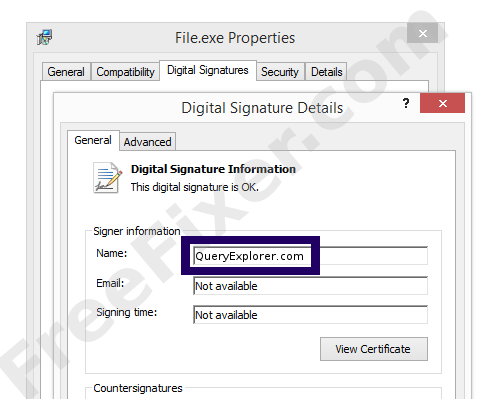QueryExplorer.com - 59% Detection Rate *
Did you just find a download or a file on your computer that is digitally signed by QueryExplorer.com? Some of the security products refers to the detected files as Gen:Variant.Adware.Zwangi.2 and BrowserModifier:Win32/Zwangi. The detection rate for the QueryExplorer.com files collected here is 59%. Please read on for more details.
You'll probably notice QueryExplorer.com when clicking to run the file. The publisher name shows up as the "Verified publisher" in the UAC dialog as the screencap shows:

You can view additional details from the QueryExplorer.com certificate with the following procedure:
- Open Windows Explorer and locate the QueryExplorer.com file
- Right-click the file and select Properties
- Click the Digital Signatures tab
- Click on the View Certificate button
Here's a screenshot of a file digitally signed by QueryExplorer.com:

As you can see in the screenshot above, Windows states that "This digital signature is OK". This means that the file has been published by QueryExplorer.com and that no one has tampered with the file.
If you click the View Certificate button shown in the screenshot above, you can see all the details of the certificate, such as when it was issued, who issued the certificate, how long it is valid, etc. You can also view the address for QueryExplorer.com, such as the street name, city and country.
UTN-USERFirst-Object has issued the QueryExplorer.com certificates. You can also examine the details of the issuer by clicking the View Certificate button shown in the screengrab above.
QueryExplorer.com Files
These are the QueryExplorer.com files I've gathered, thanks to the FreeFixer users.
| Detection Ratio | File Name |
|---|---|
| 22/43 | queryexplorer117.exe |
| 26/44 | queryexplorer.exe |
| 30/46 | queryexplorer137.exe |
Scanner and Detection Names
Here is the detection names for the QueryExplorer.com files. I have grouped the detection names by each scanner engine. Thanks to VirusTotal for the scan results.
| Scanner | Detection Names |
|---|---|
| AVG | Zwangi.L, OneStepSearcher.D |
| Agnitum | Adware.Zwangi.Gen.6, Riskware.Adware!CFf0uPYHm4E |
| AhnLab-V3 | Adware/Win32.Zwangi, Adware/Win32.Suspicious |
| AntiVir | ADSPY/AdSpy.Gen2 |
| Avast | Win32:Zwangi-J [PUP], Win32:Zwangi-P [PUP] |
| Avast5 | Win32:Zwangi-J [PUP] |
| BitDefender | Gen:Variant.Adware.Zwangi.2, Gen:Heur.Adware.Zwangi.1 |
| Commtouch | W32/Zwangi.E.gen!Eldorado |
| Comodo | UnclassifiedMalware, ApplicUnwnt.Win32.AdWare.OneStep.T |
| ESET-NOD32 | a variant of Win32/Adware.OneStep.AC, a variant of Win32/Adware.OneStep.T |
| Emsisoft | BHO.Win32.Zwangi!IK, Gen:Heur.Adware.Zwangi.1 (B), Gen:Variant.Adware.Zwangi.2 (B) |
| F-Prot | W32/Zwangi.E.gen!Eldorado |
| F-Secure | Gen:Variant.Adware.Zwangi.2 |
| Fortinet | Adware/OneStep |
| GData | Gen:Variant.Adware.Zwangi.2, Gen:Heur.Adware.Zwangi.1 |
| Ikarus | BHO.Win32.Zwangi, not-a-virus.Adware.Zwangi |
| K7AntiVirus | Adware |
| K7GW | Trojan |
| Kaspersky | HEUR:Trojan.Win32.Generic |
| Kingsoft | Win32.Troj.OneStep.re.(kcloud) |
| Malwarebytes | Adware.Agent.ZGen |
| McAfee | Adware-OneStep.f, Adware-OneStep.k |
| McAfee-GW-Edition | Adware-OneStep.f, Adware-OneStep.k |
| MicroWorld-eScan | Gen:Variant.Adware.Zwangi.2 |
| Microsoft | BrowserModifier:Win32/Zwangi |
| NANO-Antivirus | Trojan.Win32.OneStep.knrnt |
| NOD32 | a variant of Win32/Adware.OneStep.AC |
| Norman | W32/Suspicious_Gen2.IBCGD |
| PCTools | Adware.Zwunzi |
| Panda | Trj/CI.A, Generic Malware |
| Rising | Trojan.Win32.Generic.12746E48 |
| SUPERAntiSpyware | Trojan.Agent/Gen-Zwangi, Adware.Zwangi |
| Sophos | Zwangi |
| Symantec | Adware.Zwunzi!gen3, Heuristic.ADH, Trojan.ADH.2 |
| TrendMicro | TROJ_SPNR.1EJI11, ADW_ONESTEP |
| TrendMicro-HouseCall | TROJ_SPNR.1EJI11, ADW_ONESTEP |
| VIPRE | Onestepsearch |
| VirusBuster | Adware.Zwangi.Gen.6 |
| nProtect | Gen:Variant.Adware.Zwangi.2 |
* How the Detection Percentage is Calculated
The detection percentage is based on that I've gathered 133 scan reports for the QueryExplorer.com files. 78 of these scan reports came up with some sort of detection. If you like, you can view the full details of the scan reports by examining the files listed above.
Analysis Details
The analysis is based on certificates with the following serial numbers:
- 00cd04446163d04d867f3d3a8c6a78a2cd